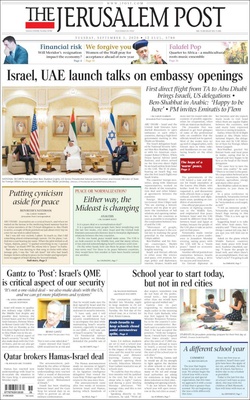
The Jerusalem Post
The Jerusalem Post is a broadsheet newspaper based in Jerusalem, founded in 1932 during the British Mandate of Palestine by Gershon Agron as The Palestine Post. In 1950, it changed its name to The Jerusalem Post. In 2004, the paper was bought by Mirkaei Tikshoret, a diversified Israeli media firm controlled by investor Eli Azur (who in 2014 also acquired the newspaper Maariv).[4] The Jerusalem Post is published in English. Previously, it also had a French edition.
Type
1 December 1932
(as The Palestine Post)
Israel
90,000
(Weekends: 120,000) (International: 50,000)
Originally a left-wing newspaper, it underwent a noticeable shift to the political right in the late 1980s.[5][6] From 2004 editor David Horovitz moved the paper to the center, and his successor in 2011, Steve Linde, pledged to provide balanced coverage of the news along with views from across the political spectrum.[7][8] In April 2016, Linde stepped down as editor-in-chief and was replaced by Yaakov Katz,[9] a former military reporter for the paper who previously served as an adviser to former Prime Minister Naftali Bennett.[10]
In March 2023, Katz stepped down as editor-in-chief and was replaced by Avi Mayer.[11] Nine months later, Mayer was replaced by Zvika Klein.[12]
The paper professes to be in the Israeli political center,[13] yet is considered to be on the political right;[14] its editorial line is critical of political corruption,[15] and supportive of the separation of religion and state in Israel.[16] It is also a strong proponent of greater investment by the State of Israel in World Jewry and educational programs for the Jewish diaspora.[17]
History[edit]
1925–1950[edit]
The first attempt to establish an English-language newspaper in Jerusalem was The Jerusalem News, established in 1919 under the auspices of the Christian Science movement, but this had no relationship to The Jerusalem Post.[18] The direct journalistic ancestry of The Jerusalem Post can be traced to The Palestine Bulletin, which was founded in January 1925 by Jacob Landau of the Jewish Telegraphic Agency.[19] It was owned by the Palestine Telegraphic Agency, which was in practice part of the JTA even though it was legally separate.[19]
On 1 November 1931, editorship of the Bulletin was taken over by Gershon Agronsky (later Agron), a Jewish journalist who had immigrated to Palestine from the United States.[20] In March 1932, a dispute arose between Landau and Agronsky, which Agronsky resolved to settle by establishing an independent newspaper.[19] Landau and Agronsky instead came to an agreement to transform the Bulletin into a new, jointly owned newspaper.[19] Accordingly, the Palestine Bulletin published its last issue on 30 November 1932 and The Palestine Post Incorporating The Palestine Bulletin appeared the following day, 1 December 1932.[19] On 25 April 1933, the masthead was reduced to just The Palestine Post although its founding year still appeared as 1925.[21] It appeared on 24 August 1934[22] but not in the following issue, 26 August,[23] or later.
Ownership changes[edit]
Until 1989, the paper supported the Labor Party. In 1989, the paper was purchased by Hollinger Inc., owned by Conrad Black. A number of journalists resigned from the Post after Black's takeover and founded The Jerusalem Report, a weekly magazine eventually sold to the Post.
Under editor-in-chief David Makovsky, from 1999 to 2000, the paper took a centrist position on defense, but began to reject socialism.[2] In 2002, Hollinger hired the politically conservative Bret Stephens of The Wall Street Journal as editor-in-chief. David Horovitz took over as editor-in-chief on 1 October 2004.[42] On 16 November 2004, Hollinger sold the paper to Mirkaei Tikshoret Limited, a Tel Aviv-based publisher of Israeli newspapers. CanWest Global Communications, Canada's biggest media concern, had announced an agreement to take a 50 percent stake in The Jerusalem Post after Mirkaei bought the property, but the deal soured. The two sides went to arbitration, and CanWest lost.[43]
In 2011, Horovitz was succeeded by the paper's managing editor, Steve Linde, who professed to maintain political moderation and balance.[44] Yaakov Katz, the paper's former military analyst and a fellow at the Nieman Foundation for Journalism, succeeded Linde in April 2016.
Websites[edit]
JPost.com[edit]
JPost.com was launched in December 1996. Its current version also contains an ePaper version of the daily newspaper, a range of magazines and other web versions of the Group's products.
The site is an entity separate from the daily newspaper. While sharing reporters, it is managed by different teams. Its staff is based in Tel Aviv, while the newspaper offices are located in Jerusalem.[45]
The site contains archives that go back to 1989, and the default search on the site sends users to archive listings, powered by ProQuest, where articles can be purchased.[46] Free blurbs of the article are available as well, and full articles are available when linked to directly from navigation within JPost.com or from a search engine.
JPost.com includes the "Premium Zone", a pay-wall protected area, containing additional Jerusalem Post articles and special features. The site, which was given a graphic facelift in September 2014, recently relaunched its mobile and tablet applications, as well as its special edition for mobile viewing.
Agron family[edit]
Gershon Agron founded the newspaper and served as its editor until he went into public service. One of his early reporters was his nephew Martin Agronsky, who later became a famous American political journalist.[49] Agronsky left the paper after only a year.[50] He felt he had been hired out of nepotism and didn't like this, wanting to earn his jobs.[51][52]
Agron's son Dani Agron worked for the newspaper, serving as its business manager in the 1970s,[53] while his wife Ethel wrote for Hadassah Magazine.[54] Martin Agronsky's son Jonathan Agronsky became a journalist in the United States.[55]